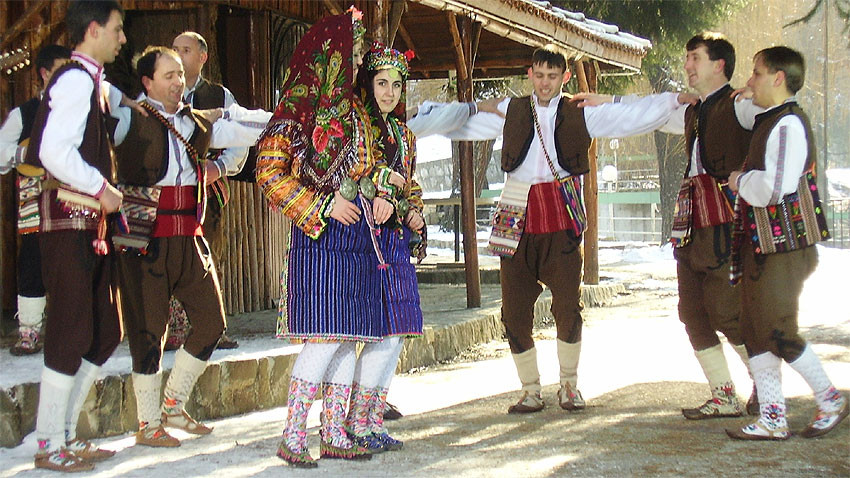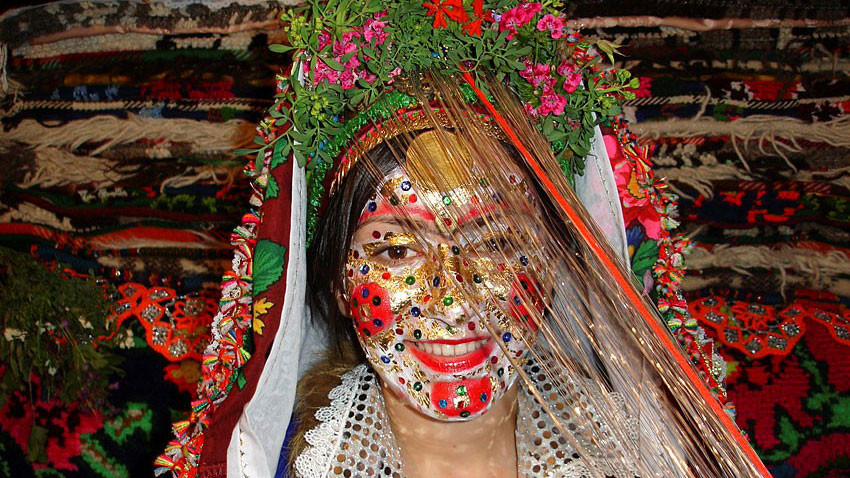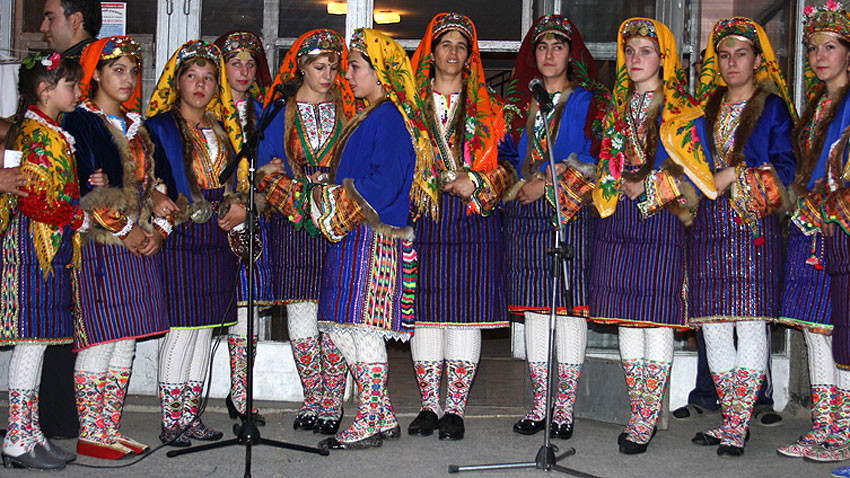Based on the strength of its population, Draginovo is Bulgaria’s fourth largest village. It is located in the Western Rhodope Mountains very close to the town of Velingrad. In the past it was known with the name Korova (from Turkish, Kuru – ova, meaning Dry Field), and was renamed to Draginovo in 1971 after Metodiy Draginov, an East Orthodox priest who wrote chronicles on the Islamization of the Bulgarian Christian population in the Rhodope Mountains. The community center in the village founded in 1936 by local teachers who took up as a mission the preservation of the local heritage, is also named after Metodiy Draginov.
At first, the center’s work was focused in the public library. Later amateur groups started presenting theater shows. The center was particularly active after 1969 when the Group for authentic songs and dances of the village of Draginovo was founded. Initially, a men’s group was formed and in 1970 women joined in too, and a dance group was launched. Folk songs in this region of Bulgaria are branded with the two-part singing – a distinct characteristics of the Shoppe and Pirin folklore regions in Southwestern Bulgaria. In other regions it is only common in separate villages.

The songs and dances of the amateurs in Draginovo dressed in their colorful traditional costumes attract the attention of both specialists and audiences at various gatherings and festivals. Their performances have been singled out with prizes at both national and international events.
The input of the founder and leader of the Group Greta Kadyova who continues to work with the amateur singers is remarkable. She is a graduate of the High School of Music in Plovdiv and has sung as member of the choir led by Prof. Asen Diamandiev. Greta Kadyova has also worked for many years in the exploration of the original folklore of the village of Draginovo and for the sake of its recreation on stage. She is proud to have attracted young people to join the song and dance group.
 “This wonderful village in the region of Velingrad is linked with Rodopa, the Rhodope Mountain, wide and powerful with its lovely voices and kindhearted people. Draginovo is a large village and its population is made up of Mohammedans (Pomaks) and Christians. The Christians are few, but the two groups live very well together. The traditions that I found here after I moved from Velingrad 48 years ago are diverse. On 27 March the festival of Karchibuk is marked. Its name comes from the custom of going out on the kar (farming field) and lighting a chibuk (a tobacco pipe) by those who had come to hire shepherds for the new farming season. In the evening working bees are held, young people dine together and go out to pick geranium. Gergyovden (St. George’s Day) in Draginovo is celebrated for two days. Preparations last as long as 2 to 3 weeks. The most interesting point is that Muslims dye eggs in the evening, put them in handmade pouches and give them to kids. On the second day they make swings as the old tradition requires. The spring feast of Blagovest (Lady-Day) is also honored with various festive rituals. On this day village people go to the forest to pick geranium, bring posies home, while young people gather for working-bees, celebrate, sing and make swings by the river. When I went to the village to work I learned about an interesting pre-wedding ritual – telyosvane. This is the process of applying make-up and decorations to the face of the bride who is already dressed up in her traditional wedding dress. If the wedding is due over the weekend, the ritual takes place on Friday and in addition the hair of the bride is plaited. This interesting custom is observed to this day.”
“This wonderful village in the region of Velingrad is linked with Rodopa, the Rhodope Mountain, wide and powerful with its lovely voices and kindhearted people. Draginovo is a large village and its population is made up of Mohammedans (Pomaks) and Christians. The Christians are few, but the two groups live very well together. The traditions that I found here after I moved from Velingrad 48 years ago are diverse. On 27 March the festival of Karchibuk is marked. Its name comes from the custom of going out on the kar (farming field) and lighting a chibuk (a tobacco pipe) by those who had come to hire shepherds for the new farming season. In the evening working bees are held, young people dine together and go out to pick geranium. Gergyovden (St. George’s Day) in Draginovo is celebrated for two days. Preparations last as long as 2 to 3 weeks. The most interesting point is that Muslims dye eggs in the evening, put them in handmade pouches and give them to kids. On the second day they make swings as the old tradition requires. The spring feast of Blagovest (Lady-Day) is also honored with various festive rituals. On this day village people go to the forest to pick geranium, bring posies home, while young people gather for working-bees, celebrate, sing and make swings by the river. When I went to the village to work I learned about an interesting pre-wedding ritual – telyosvane. This is the process of applying make-up and decorations to the face of the bride who is already dressed up in her traditional wedding dress. If the wedding is due over the weekend, the ritual takes place on Friday and in addition the hair of the bride is plaited. This interesting custom is observed to this day.”

English Daniela Konstantinova
Photos: draginovo.com and dnevnik.bg
Scientists from the Sorbonne will study the cultural heritage preserved in the Regional Ethnographic Open-Air Museum "Etar" , informs public broadcaster BNT. In March this year the French scientists together with experts of REOM "Etar" will study elements..
The day of St. Tryphon (1 February old style, 14 February new style) is celebrated by vine growers, falconers and gardeners in Bulgaria. Trifon Zarezan comes around with vine pruning and wine drinking St. Tryphon is believed to help..
All Bulgarian masquerade games originate from the ancient rituals related to the birth of the sun around Christmas. With the adoption of Christianity, in order not to defile the newborn God, the custom was blurred. In the western..

+359 2 9336 661
